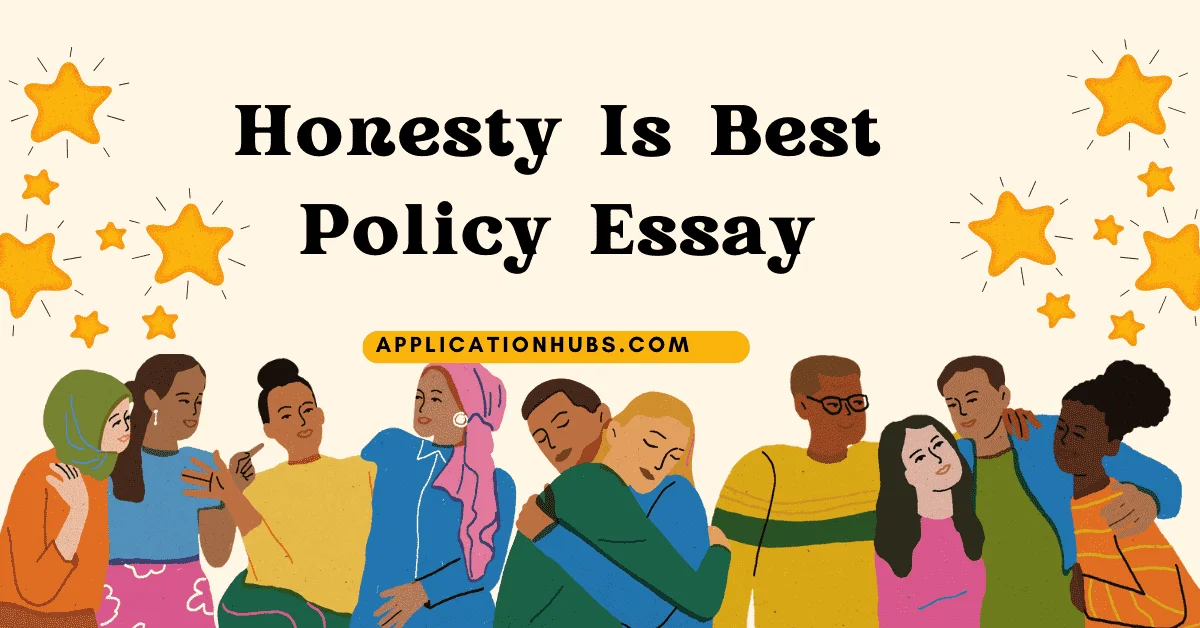This thorough exploration, encompassing [600+ Words of Honesty: The Best Policy Essay for All Classes], spans diverse societal strata. It elucidates how honesty, a cornerstone in personal and professional realms, fosters trust, integrity, and a cohesive social fabric. This cardinal virtue serves as a profound guide for individuals across all classes, fostering a culture of sincerity. Explore more in a [700+ words Independence Day essay].
150+ Words Of Honesty Is Best Policy Essay For Classes 1 To 5
- Honesty is the basis of having faith and integrity. When we are honest, we build sturdy and meaningful relationships with others.
- Being truthful means talking the truth and now not deceiving or deceptive others. It is integral to be truthful in our words, actions, and even thoughts.
- Honesty is critical in all elements of life, whether or not they are private or professional. It helps to create an advantageous and ethical social environment.
- When we are honest, we exhibit admiration for others and ourselves. We take accountability for our actions and take delivery of the consequences.
- Dishonesty, on the other hand, leads to distrust, resentment, and broken relationships. It creates a bad ecosystem and can damage men, women, and communities.
- By being honest, we obtain admiration from others. People recognize our integrity and are more likely to have faith in and remember us.
- In conclusion, honesty is indeed a first-rate policy. It is a virtue that promotes trust, builds character, and creates a wonderful and moral environment.
300+ Words Of Honesty Is Best Policy Essay For Classes 6 To 10
The Timeless Wisdom: “Honesty is the Best Policy”
Honesty is a precept that stands the test of time, proving its relevance in quite a number of facets of life. Whether in personal relationships, expert pursuits, or day-to-day interactions with strangers, the age-old adage “Honesty is the nicest policy” rings true. At its core, honesty serves as the bedrock upon which trust is built—an essential element for the success of any relationship.
Creating Transparency and Openness
When we include honesty in our interactions, we establish an environment of transparency and openness. This creates a feeling of relief within people, understanding that there are no hidden agendas or attempts to deceive.
“ If I lose mine honor, I lose myself.” – [William Shakespeare]
Stronger connections are forged, and authentic communication becomes the norm. Conversely, dishonesty weaves a web of deceit that erodes trust, taking years to build but mere seconds to break.
Personal Growth Through Honesty
Beyond its impact on relationships, honesty plays a fundamental position in non-public increase and development. Confronting the truth, even when uncomfortable, permits us to perceive strengths and weaknesses, fostering self-improvement. The courage to be straightforward with ourselves empowers knowledgeable decision-making and paves the way for a greater genuine and satisfying life.
Professional Integrity: A Cornerstone of Success
In the professional realm, honesty is equally indispensable. Employers highly value honesty and reliability, as these qualities establish trust and confidence in handling significant tasks. A workplace grounded in honesty cultivates a positive and productive atmosphere, where open communication, learning from mistakes, and effective teamwork flourish.
A Call to Prioritize Honesty
In conclusion, the enduring wisdom of “Honesty is the Best Policy” underscores its pivotal role in our lives. It not only forms the basis of belief and strengthens relationships but additionally contributes to private and expert growth. By constantly deciding on honesty, we no longer solely gain ourselves but additionally make contributions to the creation of an extra-moral and harmonious society. Let us, therefore, prioritize honesty and harness its transformative energy in our daily lives.
600+ Words of Honesty Is the Best Policy Essay for Classes 11, 12, and…
Overview: The Influence of Veracity
Integrity has long been recognized as a necessary component of human civilization. In social and professional contexts, this quality promotes honesty, sincerity, and trust. Sincere expression is valued, and honest and straightforward communication is crucial, as the proverb “Honesty is the best policy” effectively conveys.
Historical Background
There is a lengthy history of philosophical traditions and ancient teachings that guide the idea that honesty is an excellent policy. In classical Greece, the philosopher Socrates promoted honesty as a path to knowledge and information. He thought that the pursuit of truth and the advancement of society required open communication.
“There’s always a way to be honest without being brutal.” – Arthur Dobrin
Benjamin Franklin: Influential American Statesman
One of America’s founding fathers, Benjamin Franklin, was instrumental in elevating integrity to the status of an imperative virtue. Franklin highlights the cost of being straightforward with oneself and others in his time-honored autobiography.He thought that both professional and personal success were directly correlated with honesty.
Mahatma Gandhi: Promoter of Truth and Nonviolence
The well-known leader of the Indian independence movement, Mahatma Gandhi, observed that honesty has enormous influence. He followed the Satyagraha school of thought, which is Sanskrit meaning “truth force” or “soul force.” Gandhi demonstrated the power of honesty via nonviolent resistance, which he felt might bring about social and political transformation.
Nelson Mandela: Integrity in Leadership
Throughout his life, Nelson Mandela, the inspirational leader of the South African anti-apartheid movement, lived a life of integrity and honesty. He thought that the quality of honesty was crucial for a reliable leader. In the years following apartheid, Mandela’s dedication to the truth was essential to fostering peace in South Africa.
Honesty in Personal Relationships
Honesty is indispensable in non-public relationships, as it fosters trust, communication, and emotional connection. In an era where social media regularly promotes superficiality and dishonesty, people who prioritize straightforward and open verbal exchange contribute to healthier and more meaningful relationships.
“Honesty is the fastest way to prevent a mistake from turning into a failure.” – [ James Altucher]
The Negative Dimensions of Honesty
Even though it’s usually seen as a positive quality, honesty can sometimes backfire. The truth can occasionally be cruel, painful, or destructive. As such, before speaking the whole truth, people should think about the possible consequences of their statements. Sustaining strong relationships requires striking a balance between being sensitive and honest at the same time.
Perspectives on the Future of Honesty
The dissemination of false information and deceit can happen quickly in the digital era, posing new difficulties for honesty. Social networking sites are frequently overrun with false information, dishonesty passed off as reality, and fake news. To counter these problems, however, initiatives are being launched to encourage critical thinking and digital literacy. In addition, a few tech firms are taking action to stop disinformation and make the internet a more truthful place.
Conclusion: The Timeless Importance of Honesty
To sum up, the adage “600 words of honesty is the best policy” emphasizes the value of being genuine in social, professional, and personal settings. Prominent historical figures, including Nelson Mandela, Mahatma Gandhi, and Benjamin Franklin, have acknowledged the value of honesty and its effect on advancement and human relationships.
Future Developments: Nurturing Honesty in Modern Society
As we navigate the future, fostering a tradition of honesty, both online and offline, becomes imperative. Communities, families, and educational institutions should sow the seeds of integrity within their realms, nurturing the growth of an honest society.
Promoting media literacy, moral decision-making, and crucial questioning is pivotal in shaping a greater ethical culture. Furthermore, the ongoing collaboration between technological know-how companies and legislators is fundamental to tackling the challenges posed by using false records and online fraud, working closer to the establishment of an online environment grounded in honesty and truthfulness. Through these collective efforts, we strive to construct a foundation where honesty remains not simply a virtue but a guiding principle shaping our interconnected world.
FAQ’s
Why honesty is a best policy essay?
Honesty is the best policy because it builds trust, fosters integrity, and forms the foundation for strong relationships, both personal and professional, creating a harmonious and ethical society.
Why is honesty important?
Honesty is crucial for building trust, maintaining integrity, and fostering transparent communication. It forms the bedrock of ethical behavior, strengthens relationships, and contributes to a harmonious and trustworthy society.
What are 5 benefits of honesty?
- Trust Building: Honesty establishes trust, fostering open communication.
- Integrity Maintenance: Upholding moral principles promotes personal and professional integrity.
- Relationship Strengthening: Honest communication deepens connections authentically.
- Conflict Resolution: Addressing issues directly facilitates effective resolution.
- Personal Growth: Embracing honesty encourages self-reflection, fostering continuous personal development.

